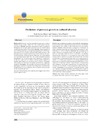Identificador persistente para citar o vincular este elemento:
https://accedacris.ulpgc.es/jspui/handle/10553/42412
| Campo DC | Valor | idioma |
|---|---|---|
| dc.contributor.author | Barraza Illanes, Paula Andrea | en_US |
| dc.contributor.author | Calvo-Francés, Fernando | en_US |
| dc.date.accessioned | 2018-11-09T13:41:18Z | - |
| dc.date.available | 2018-11-09T13:41:18Z | - |
| dc.date.issued | 2018 | en_US |
| dc.identifier.issn | 0214-9915 | en_US |
| dc.identifier.uri | https://accedacris.ulpgc.es/handle/10553/42412 | - |
| dc.description.abstract | Background: Knowledge about the psychological experience in induced abortion remains limited. Studies have been biased towards negative consequences. Method: A descriptive and prospective study was conducted. Participants were 338 adult women who came to have an induced abortion in authorized centers of Las Palmas (Spain). Results: A large proportion of women reflected moderate to very high personal growth at all measurement times (from 64.79% to 76.36%), with statistically significant increases. The perception of social support explained most of the variance in the cross-sectional prediction of personal growth, both at the time of the abortion and in the follow-up one month later. The variables that predicted growth longitudinally were: greater perception of the abortion as a turning point in their lives, lower level of academic education, greater frequency of thoughts about abortion one month later, lower frequency of thoughts about abortion six months later, and greater perceived social support one month later. Conclusions: The perception of personal growth is part of the psychological experience of abortion. This finding invites us to broaden the traditional focus on the psychological effects of induced abortion, to also include the positive outcomes. | en_US |
| dc.description.abstract | Antecedentes: el conocimiento sobre la experiencia psicológica del aborto inducido sigue siendo limitado. Los estudios se han sesgado hacia las consecuencias negativas. Método: estudio descriptivo y prospectivo. Participaron 338 mujeres adultas que interrumpieron voluntariamente su embarazo en centros autorizados de Las Palmas (España). Resultados: una gran proporción de mujeres reflejó un crecimiento personal entre moderado y muy alto en todas las evaluaciones (desde un 64,79% a un 76,36%), con aumentos estadísticamente significativos. La percepción del apoyo social explicó la mayor parte de varianza en la predicción transversal del crecimiento personal, tanto en el momento del aborto como en el seguimiento un mes después. Las variables que predijeron el crecimiento longitudinalmente fueron: mayor percepción del aborto como un punto de inflexión en sus vidas, menor nivel de educación académica, mayor frecuencia de pensamientos sobre el aborto un mes después, menor frecuencia de pensamientos sobre el aborto seis meses después, y mayor percepción de apoyo social un mes después. Conclusiones: la percepción del crecimiento personal es parte de la experiencia psicológica del aborto. Este hallazgo invita a ampliar el enfoque tradicional sobre los efectos psicológicos del aborto inducido, para incluir también los resultados positivos. | en_US |
| dc.language | eng | en_US |
| dc.publisher | 0214-9915 | |
| dc.relation.ispartof | Psicothema | en_US |
| dc.source | Psicothema[ISSN 0214-9915],v. 30, p. 370-375 | en_US |
| dc.subject | 32 Ciencias médicas | en_US |
| dc.subject.other | Induced abortion | en_US |
| dc.subject.other | Event centrality | en_US |
| dc.subject.other | Social support | en_US |
| dc.subject.other | Stress-related growth | en_US |
| dc.subject.other | Subjective stress | en_US |
| dc.subject.other | Aborto inducido | en_US |
| dc.subject.other | Centralidad del evento | en_US |
| dc.subject.other | Apoyo social | en_US |
| dc.subject.other | Crecimiento relacionado con el estrés | en_US |
| dc.subject.other | Estrés subjetivo | en_US |
| dc.title | Predictors of personal growth in induced abortion | en_US |
| dc.type | info:eu-repo/semantics/Article | es |
| dc.type | Article | es |
| dc.identifier.doi | 10.7334/psicothema2018.65 | |
| dc.identifier.scopus | 85055595065 | |
| dc.identifier.isi | 000447955000003 | |
| dc.contributor.authorscopusid | 57204470091 | |
| dc.contributor.authorscopusid | 6506751854 | |
| dc.description.lastpage | 375 | - |
| dc.identifier.issue | 4 | - |
| dc.description.firstpage | 370 | - |
| dc.relation.volume | 30 | - |
| dc.investigacion | Ciencias de la Salud | en_US |
| dc.type2 | Artículo | en_US |
| dc.contributor.daisngid | 29098818 | |
| dc.contributor.daisngid | 8833537 | |
| dc.contributor.wosstandard | WOS:Illanes, PB | |
| dc.contributor.wosstandard | WOS:Calvo-Frances, F | |
| dc.date.coverdate | Noviembre 2018 | |
| dc.identifier.ulpgc | Sí | es |
| dc.description.sjr | 0,641 | |
| dc.description.jcr | 1,551 | |
| dc.description.sjrq | Q2 | |
| dc.description.jcrq | Q2 | |
| dc.description.ssci | SSCI | |
| dc.description.dialnetimpact | 2,0 | |
| dc.description.dialnetq | Q1 | |
| dc.description.erihplus | ERIH PLUS | |
| item.grantfulltext | open | - |
| item.fulltext | Con texto completo | - |
| crisitem.author.dept | Departamento de Enfermería | - |
| crisitem.author.orcid | 0000-0002-0532-5096 | - |
| crisitem.author.orcid | 0000-0002-4282-5049 | - |
| crisitem.author.fullName | Barraza Illanes, Paula Andrea | - |
| crisitem.author.fullName | Calvo Francés, Fernando | - |
| Colección: | Artículos | |
Citas SCOPUSTM
4
actualizado el 08-jun-2025
Citas de WEB OF SCIENCETM
Citations
5
actualizado el 22-feb-2026
Visitas
90
actualizado el 13-jul-2024
Descargas
38
actualizado el 13-jul-2024
Google ScholarTM
Verifica
Altmetric
Comparte
Exporta metadatos
Los elementos en ULPGC accedaCRIS están protegidos por derechos de autor con todos los derechos reservados, a menos que se indique lo contrario.
